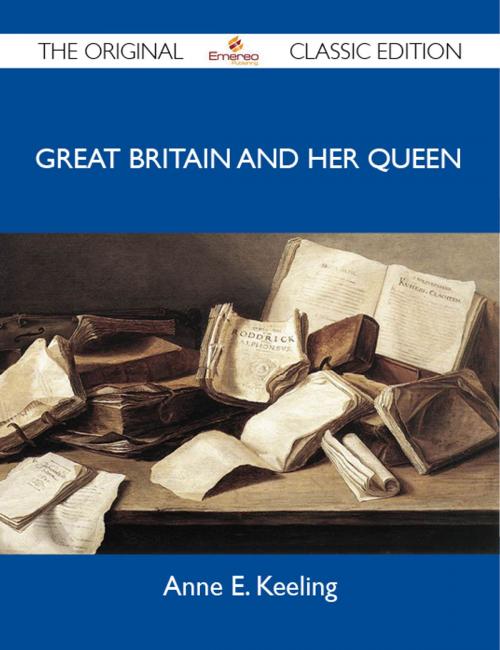Great Britain and Her Queen - The Original Classic Edition
Nonfiction, Reference & Language, Reference, Fiction & Literature| Author: | Keeling Anne | ISBN: | 9781486418923 |
| Publisher: | Emereo Publishing | Publication: | October 24, 2012 |
| Imprint: | Emereo Publishing | Language: | English |
| Author: | Keeling Anne |
| ISBN: | 9781486418923 |
| Publisher: | Emereo Publishing |
| Publication: | October 24, 2012 |
| Imprint: | Emereo Publishing |
| Language: | English |
This is a new and freshly published edition of this culturally important work by Anne E. Keeling, which is now, at last, again available to you.
Enjoy this classic work today. These selected paragraphs distill the contents and give you a quick look inside Great Britain and Her Queen:
Rather more than one mortal lifetime, as we average life in these later days, has elapsed since that June morning of 1837, when Victoria of England, then a fair young princess of eighteen, was roused from her tranquil sleep in the old palace at Kensington, and bidden to rise and meet the Primate, and his dignified associates the Lord Chamberlain and the royal physician, who were come on business of state to the Queen-words of startling import, for they meant that, while the royal maiden lay sleeping, the aged King, whose heiress she was, had passed into the deeper sleep of death.
...Her royal courage and gracious tact, her transparent truthfulness, her high sense of duty, and her precocious discretion served her well; but these young excellences could not have produced their full effect had she not found in her first Prime Minister a faithful friend and servant, whose loyal and chivalrous devotion at once conciliated her regard, and who only used the influence thus won to impress on his Sovereigns mind sound maxims of constitutional government, and truths of every description which it behoved her to learn.
...A modern English imagination is quite unequal to the task of realising the manifold hindrances that beset human intercourse at that day, when a journey by coach between places as important and as little remote from each other as Leeds and Newcastle occupied sixteen mortal hours, with changes of horses and stoppages for meals on the road, and when letters, unless forwarded by an express messenger at heavy cost, tarried longer on the way than even did passengers; while some prudent dwellers in the country deemed it well to set their affairs in order and make their wills before embarking on the untried perils of a journey up to town. These days are well within the memory of many yet living; but if the newer generations that have arisen during the present reign would understand what it is to be hampered in their movements and their correspondence as were their fathers, they must seek the remoter and more savage quarters of Europe, the less travelled portions of America or of half-explored Australia; they must plunge into Asian or African wilds, untouched by civilisation, where as yet there runs not the iron horse, worker of greater marvels than the wizard steeds of fairy fable, that could, transport a single favoured rider over wide distances in little time.
...Prince Albert of Saxe-Coburg, second son of the Duke of Saxe-Coburg-Saalfeld, the Queens maternal uncle, was nearly of an age with his royal cousin; he had already, young as he was, given evidence of a rare superiority of nature; he had been excellently trained; and there is no doubt that Leopold, king of the Belgians, his uncle, and the Queens, did most earnestly desire to see the young heiress of the British throne, for whom he had a peculiar tenderness, united to the one person whose position and whose character combined to point him out as the fit partner for her high and difficult destinies.
This is a new and freshly published edition of this culturally important work by Anne E. Keeling, which is now, at last, again available to you.
Enjoy this classic work today. These selected paragraphs distill the contents and give you a quick look inside Great Britain and Her Queen:
Rather more than one mortal lifetime, as we average life in these later days, has elapsed since that June morning of 1837, when Victoria of England, then a fair young princess of eighteen, was roused from her tranquil sleep in the old palace at Kensington, and bidden to rise and meet the Primate, and his dignified associates the Lord Chamberlain and the royal physician, who were come on business of state to the Queen-words of startling import, for they meant that, while the royal maiden lay sleeping, the aged King, whose heiress she was, had passed into the deeper sleep of death.
...Her royal courage and gracious tact, her transparent truthfulness, her high sense of duty, and her precocious discretion served her well; but these young excellences could not have produced their full effect had she not found in her first Prime Minister a faithful friend and servant, whose loyal and chivalrous devotion at once conciliated her regard, and who only used the influence thus won to impress on his Sovereigns mind sound maxims of constitutional government, and truths of every description which it behoved her to learn.
...A modern English imagination is quite unequal to the task of realising the manifold hindrances that beset human intercourse at that day, when a journey by coach between places as important and as little remote from each other as Leeds and Newcastle occupied sixteen mortal hours, with changes of horses and stoppages for meals on the road, and when letters, unless forwarded by an express messenger at heavy cost, tarried longer on the way than even did passengers; while some prudent dwellers in the country deemed it well to set their affairs in order and make their wills before embarking on the untried perils of a journey up to town. These days are well within the memory of many yet living; but if the newer generations that have arisen during the present reign would understand what it is to be hampered in their movements and their correspondence as were their fathers, they must seek the remoter and more savage quarters of Europe, the less travelled portions of America or of half-explored Australia; they must plunge into Asian or African wilds, untouched by civilisation, where as yet there runs not the iron horse, worker of greater marvels than the wizard steeds of fairy fable, that could, transport a single favoured rider over wide distances in little time.
...Prince Albert of Saxe-Coburg, second son of the Duke of Saxe-Coburg-Saalfeld, the Queens maternal uncle, was nearly of an age with his royal cousin; he had already, young as he was, given evidence of a rare superiority of nature; he had been excellently trained; and there is no doubt that Leopold, king of the Belgians, his uncle, and the Queens, did most earnestly desire to see the young heiress of the British throne, for whom he had a peculiar tenderness, united to the one person whose position and whose character combined to point him out as the fit partner for her high and difficult destinies.















